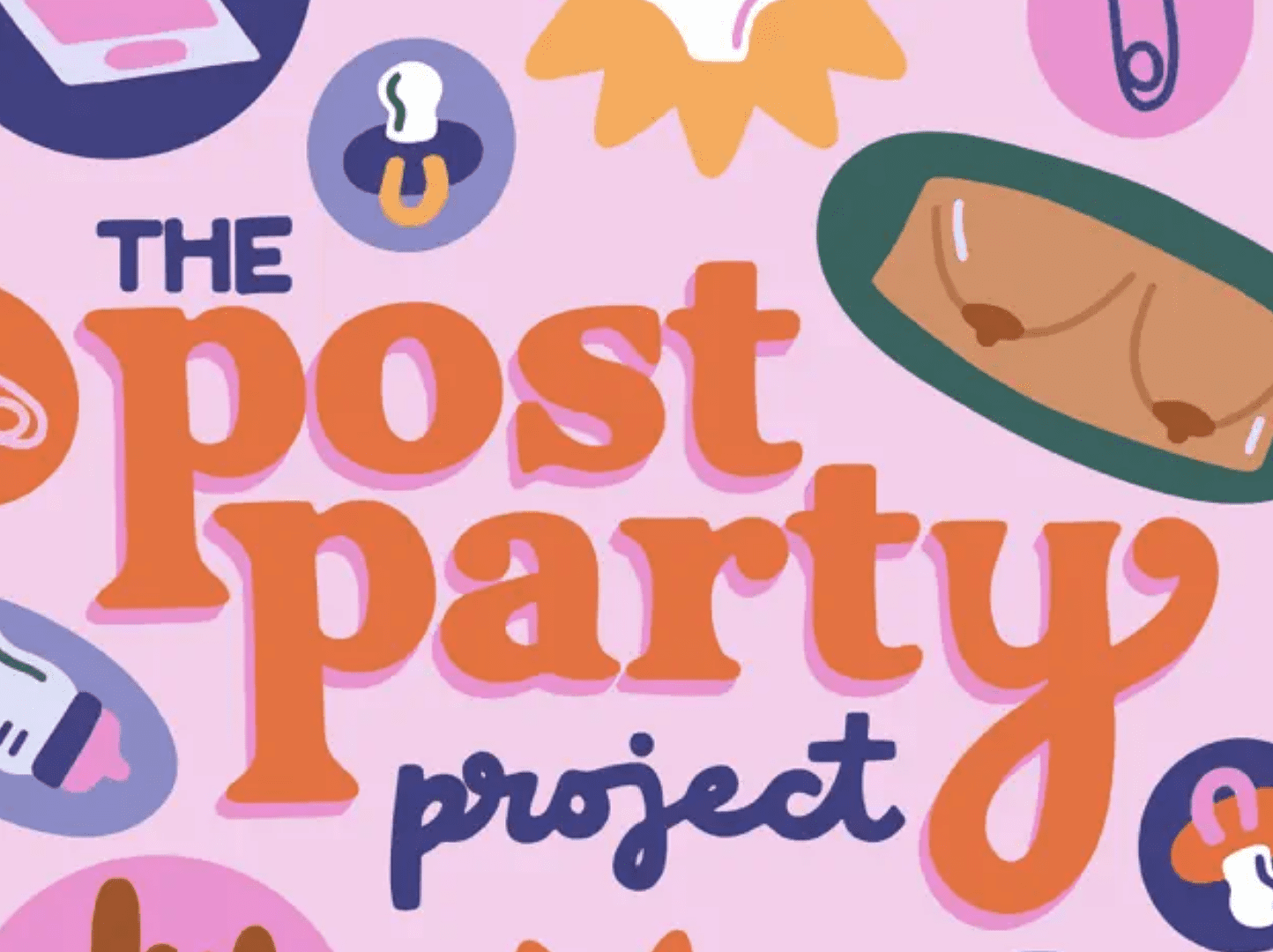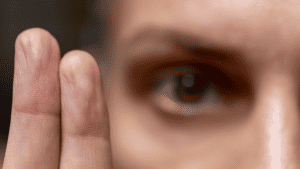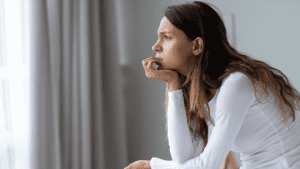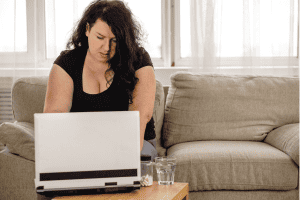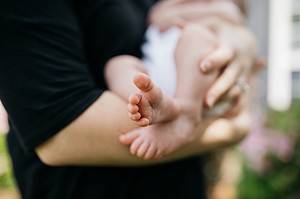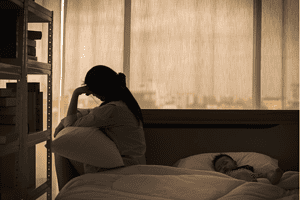This blog post is a transcript of the podcast interview between Aimee Heinrich and Fiona Rogerson, for The Post Part Project.
Birth Trauma… do I have it? How to support someone with their birth trauma, Postnatal depression in our partners – with Fiona Rogerson (Episode #15)
Aimee: [00:00:03] Hello and welcome to the Post Party Project. My name is Amy Heinrich and I am your host. Join me as we chat all things post-partum, celebrating the highs and supporting you through the lows. Everything pregnancy and birth is just such an exciting time. But often chats about postpartum experiences get missed or overlooked because everything’s about the baby, which we are also totally here for. But I’m here to hear you and hold you, figuratively speaking, and to listen to your experience. Think of this podcast as your safe space to share, vent, cry, love, and know that you’re not alone. Now let’s get into it. Hello. Welcome back to the post-party project. It feels like this is one of the first Mondays in so long where I’ve got my voice. Everyone’s happy and healthy. Iv’s at daycare. The sun is shining. Oh, man. Let’s just hope it stays like this. Please cross your fingers for me. Anyway, in today’s episode, I chat with Fiona, who is a birth trauma and perinatal counsellor. She specializes in supporting you through trauma and PTSD, recovery, birth trauma and perinatal difficulties. I’ve spoken to a few women who have experienced birth trauma, so I found today’s episode really interesting. We chat about what birth trauma is and how to identify if we have it, what the difference is between postnatal depression, postnatal anxiety and birth trauma. What we can do to prepare for birth the second time around. If we’ve experienced birth trauma, how to support a friend or family member who has had a traumatic birth and so much more. I’ve also included Fiona’s details in the show notes so you can easily reach out and get in touch with her if this chat resonates and you want to reach out. Let’s get into today’s chat. Thank you so much for joining me today, Fiona. I cannot wait to have this chat with you because I’ve had so many girls like it comes up in so many of our conversations. Birth trauma specifically. So thank you for joining me. Yes, thanks for coming on.
Fiona: [00:03:27] Thank you for having me. I’ve been really looking forward to it. It’s taken a while for us to get here, hasn’t it?
Aimee: [00:03:32] Yes. In between sicknesses and everything that goes on.
Fiona: [00:03:36] Yes, absolutely.
Aimee: [00:03:37] So Yes. Tell us a little bit about yourself, who is in your family and I guess specifically what you do for work.
Fiona: [00:03:43] Sure. So in my family… I’m a mum of three, I have a 16 year old, a ten year old and an eight year old. So life is a little bit busy on the work side of things. I work primarily as a perinatal and trauma counsellor, so I work in private practice. I see clients from across Australia through telehealth and more locally in Perth. I have a counselling space in success here in WA, so I do that. I have my finger in a few different pies though at the same time. So I also offer trauma informed hypnobirthing classes, particularly for parents who have experienced trauma previously. So those classes are designed to work with them and what they’ve experienced before. I also work with other clinicians, so I do supervision for one of the universities here in WA for their Masters Counselling students, and I do some training as well where I’m lucky enough to be able to train the students from the Doula Training Academy in the area of birth trauma. So hopefully setting up some really strong health professionals to be able to work with this. And yes, but I’ve got a course coming out specifically for perinatal professionals. Give them some insight and tools. So lots of different things going on at the moment.
Aimee: [00:05:05] I already feel that your energy just feels so calming and just like I feel like you would be the right person to go to with any of these any of these things.
Fiona: [00:05:13] Thank you. I think that when you when you’ve been doing it for so long and being in that space for so long, I think it’s easy to really just be able to connect with people. I know what they need. I’ve been working with perinatal women for a long time now, initially as a birth and newborn photographer from 2009, which transitioned into doula work. So worked in the birth space in birth and also postnatal, then moved on to childbirth education and now doing a lot of trauma work. Now able to work on the other side of those experiences.
Aimee: [00:05:51] Yes, that’s amazing. It’s like you’ve seen the whole, the whole array of the beauty awfulness of like newborn stage and birth and everything and now coming back to help women. I think that’s so amazing.
Fiona: [00:06:00] Yes, I think it’s a unique perspective to have on being able to really support and understand women in this space, particularly with trauma. Also experienced it myself as a mother. So being able to see it from a lot of different vantage points, it’s definitely helped me with what I do now.
Aimee: [00:06:17] I was going to ask, what was your experience like postpartum then?
Fiona: [00:06:21] That’s an interesting one. I will say honestly, for my first child, who is now 16, I have a lot of gaps in my memory for her postpartum and I do put that down to undiagnosed depression after her birth and potentially trauma as well in relation to my experience with her birth. So I couldn’t give you any real insight into what that was like. But I know it was vastly different for my boys, my second and third children, where their experience of birth with me was very different, vastly different to what I experienced with my first, so I have very clear memories of their postpartum periods, my postpartum period with them. And, and it was well supported. But yes, there was a lot of, a lot of undiagnosed trauma from my first birth. So it took seven years after my first birth for that knowledge and that awareness of what had happened to finally come to the surface so I could work through it. So a lot of disconnection in there, a lot of numbness through all of the experiences, but yet it took seven years to be able to realize that and reach out for some support.
Aimee: [00:07:36] Wow. And is that kind of how you came to the decision to have the other two? Did you learn that you needed to do a bit of work and stuff to heal from that?
Fiona: [00:07:43] I had those two in that stage in that period, and it wasn’t until after my third child that I did speak to somebody on a professional level for an unrelated, unrelated difficulty. I ended up after years of work as a photographer, I went and saw a careers counsellor and I was really feeling the need to pull away from photography and immerse myself more into the perinatal space in some way. I went to see a counsellor who can help me with that decision. And it wasn’t until I spoke with her in that session that she attuned herself into the numbness I was feeling and my inability to answer questions clearly. She was the one that saw some red flags within me. I wasn’t there, the preconceived idea of what depression was. So I wasn’t crying. I was running a really successful business. I wasn’t falling apart at the seams, which is what I assumed would be happening if I was experiencing any difficulties personally. But I wasn’t. I had it all together. But she noticed some signs that aren’t typical or they are typical, but not something that we often acknowledge. And she was the one that said, You need to go and see somebody else. So I did. And Yes, it was there. It was there, front and centre. And I went and saw a counselor myself and she was the one that pulled me out of that and supported me in healing. Hmm.
Aimee: [00:09:19] That’s very interesting. So did you learn quite a bit then from that into how you practice today?
Fiona: [00:09:25] Absolutely. It was working with her that definitely inspired me to do the work that I’m doing now and what my awareness to all of my experiences and that I have been I have been through a lot of what the women I see now experience have been through that postnatal anxiety, post-natal depression, a lot of prenatal anxiety as well. I’ve been through assisted conception, IVF, pregnancy loss, breastfeeding, trauma, a lot of it. But she supported me through so it was opened my eyes to I guess I’ve learned a lot from this and it’s what I want to work with. So fast forward and here I am.
Aimee: [00:10:07] Yes, that’s so interesting. How what kind of services do you offer in particular?
Fiona: [00:10:13] I work with a lot of individuals, male and female, in the counselling space. Offering counselling for trauma related difficulties related to perinatal or not, it’s a lot of developmental and childhood trauma as well and perinatal difficulties across the board. I offer EMDR therapy for trauma specifically and also for perinatal professionals who obviously experience a lot in their work. I offer birth debriefing, so standalone birth debriefing sessions that can progress onto counselling if the need is there. But as I mentioned before that the Hypnobirthing classes are tailored to work with trauma and to understand and acknowledge events that have taken place for women and to be able to support them in being able to do it again. So that’s probably the bulk of my work. But Yes, as I mentioned before, training, mentoring, supervision, all on top of that as well. Yes.
Aimee: [00:11:10] So what is birth trauma and how can we identify if we have it?
Fiona: [00:11:15] That’s a really good question. I guess the best way to talk about trauma is to understand that it’s it’s got nothing to do with what happens to us. It has nothing to do with events that take place. But it’s what happens inside of us as a result of what’s happened to us on the outside. So it’s the internal response from our nervous system when it is overwhelmed with the perception of a threat. So that’s what trauma is in a nutshell. If there is a perception of threat and perception is the key word there. So it doesn’t have to be an actual threat. Does it have to be a physical threat? If there is any perceived threat, then our nervous system can see that or respond to that as a real threat. It’s that internal response that will ensue. When we’re talking about birth trauma, we’re not necessarily having to just talk about labour and birth. I see it as more perinatal trauma, which can happen anywhere inside of conception or trying to conceive right through to the end of a postpartum journey. Anything that happens in that scope, if there is any perceived threat, then trauma can ensue from it.
Aimee: [00:12:25] So if we had that, would there be a ways that we can identify that in ourselves?
Fiona: [00:12:30] Absolutely. I think one of the key things to acknowledge here is that a lot of the symptoms of trauma do overlap with other difficulties. So it might be post-natal depression or anxiety, but there are always physical indicators, emotional indicators, behavioural indicators and cognitive or the way that we think that will show us indicators. So physical symptoms might include having type tests, rapid heart rate, anything from loss of appetite, panic attacks, skin upsets. It’s a really intense list of what can happen to the body because it’s the body receiving that threat. Then we have emotional symptoms and that can range again, really widespread from anger, fear, shame, anxiety, numbness or checking out emotionally depressive episodes. Which can be a reason why trauma is often or sometimes can be misdiagnosed as depression. There might be inappropriate guilt, hopelessness, and then we have behavioural symptoms. So avoiding situations, avoiding places, supporting people, feeling the need to be over, controlling maybe there’s hypervigilance or real fear of your safety or your child’s safety. Impulsive behaviours, compulsive behaviours, self-medication, rage. Again, really, really long list of things that can be attributed behaviourally. And then we have cognitive symptoms. So the way we thought, the way we think. So we might have room. Addiction, racing thoughts, obsessive thoughts, constantly imagining worst case scenarios we might re-experience. We might take ourselves and put ourselves back in that experience again and again and again, we might start to idealize people that were present at that birth, and we see that a lot with particularly trauma, that experience that is experienced in labour and birth. An individual might look at their caregiver and idealized them and think or feel that they saved them when they may have been a lot of other factors involved in the actions of that individual. So there’s a lot of things that we can look out for and become aware of.
Aimee: [00:14:51] Do they kind of start like, when would you notice them happening? Would they be mostly post-birth? Or can it happen up until a year more?
Fiona: [00:15:00] How long can you see time? There is no there’s no limit on when any of this can present. We have a really intelligent body and it does what it needs to do in order to help us cope. For some women, that might be the presentation of symptoms really early on. For other women, it might be the body kind of contains it, puts it in the box and sits it up on the shelf so that she can continue to function and continue to take care of her children. At some point, the box may start to open or things may start to seep out of it. Where we start to notice maybe physical symptoms start to present, even though there is no cause we can attribute to those symptoms, or suddenly emotional dysregulation might present, or she might start to have memories from that experience. So there is really no no time limit on when it can present, but it’s really important to know there’s also no time limit then on when you can heal from it. So just because the birth took place 20 years ago, it doesn’t mean that nothing can be done to resolve that experience.
Aimee: [00:16:13] So interesting. Is there a really a way then to differentiate between postnatal depression, postnatal anxiety and birth trauma?
Fiona: [00:16:22] Yes, there’s there is quite an overlap of symptoms when it comes to birth trauma, particularly things like PTSD and depression and anxiety. So there will be a set of, I guess, symptoms that might be common to all of them, but there will also be some differences. So common symptoms might be things like a loss of interest in things that you’ve enjoyed previously. There might be a level of detachment or disconnect from people or things around you, a level of guilt and shame that might present whether you’re experienced trauma through PTSD or whether you’re experiencing postnatal depression or whether it’s anxiety, feelings of being unable to cope, negative thinking, sleep difficulties. So those all of those are things that are kind of the overlap between those three. But then we have things that are very unique or specific as well. So for example, if we’re talking PTSD, we might have experienced the physical and emotional flashbacks. There might be intrusive memories, there might be panic attacks, nightmares with post-natal depression, it might be deep sadness, feeling worthless, not able to seek pleasure, low moods, appetite changes, and then with anxiety, the inability to relax or a constant restlessness, the persistent feeling of being frustrated, panic attacks that might arise from being hypervigilant. So yes, there can be some really unique characteristics. And it’s not a given that if you experience one, you’re going to experience another experience. Experiencing one of these might make you more, I guess, susceptible to experiencing other others of these. But it’s not necessarily a given.
Aimee: [00:18:13] What can we do and how should we respond if someone close to us has experienced birth trauma or had a traumatic birth?
Fiona: [00:18:21] This is such a great question. I love this question. And it’s one that’s really prompted me to put my course together for perinatal professionals, in particular, with teaching us how to respond to someone who discloses trauma or who has experienced it. A few things to think about would be to not try and fix it. We can’t fix it for someone else. We can’t take away their experience. We can’t change what’s happened. So don’t enter a conversation with them to try and fix what’s happened. The second would be to not question that person or not push them for more information. If somebody comes to you and they are wanting to talk to you about their experience, avoid questioning for more detail. That’s to satisfy our own curiosity. Not necessarily. What that individual needs. It’s really important when somebody is talking through their experience that they do it at a pace that feels safe for them. And constant questioning of more information can push them to feel unsafe, which can add to that trauma. If we’re talking about perception of threat or safety, self disclosure is something that often comes up as well when people are listening to somebody else talk. We can have that real need to say, yes, that happened to me or that happened to somebody I know down the road that should be avoided.
Fiona: [00:19:40] That conversation is about that person and their experience, not about you and your experience. There’s other, other times and places to be able to do that. And just a couple of more. Many women have their experience dismissed and rolled into the idea that it’s just a part of motherhood, and that if we are making the decision to have children, that we are ultimately making the decision to go through this this christening, this entry into it through through trauma, and dismissing her experience as a part of motherhood only adds to the problem. It doesn’t help her. That also rolls into the next point when there is that real toxic positivity that comes through when anybody tries to talk about trauma. Well, at least you have a healthy baby. At least you’re safe. That’s over. Now it’s time to move on. Shrouding somebody in toxic positivity just denies them of their experience. It’s dismissing and it’s invalidating. And then I guess the worst thing that we can do is to not respond at all is to pretend it didn’t happen. If somebody has experienced birth trauma, to not acknowledge it is causing a lot of harm for a lot of people out there.
Aimee: [00:20:55] Yes, I think one of the main things that I always hear women say is, you know, you just give birth. You have to leave your dignity at the door.
Fiona: [00:21:02] Yes. And where did that come from? Why is that suddenly a part of our experience? It’s crazy.
Aimee: [00:21:09] Yes, you shouldn’t. That shouldn’t even be a thing. Like, you should always feel safe, and it’s not even about that.
Fiona: [00:21:14] Yes, for sure.
Aimee: [00:21:17] So, yes, I guess with the main thing, be just kind of holding space and just really being there for someone who has experienced it.
Fiona: [00:21:24] Yes, absolutely. It’s checking in and our own actions and what our intentions are and only support them. Are we there for them or are we there to make ourselves feel better?
Aimee: [00:21:33] Yes, and I think that’s what happens a lot of the time. Some people just feel like they’ve ticked off a few boxes if they’ve offered advice or whatever they’ve done, and it kind of leaves that person feeling crappy that maybe that person’s like, I’ve done my good deed, now I’m off to have a coffee or whatever.
Fiona: [00:21:48] Yes, for sure.
Aimee: [00:21:49] Yes. So if we have experienced birth trauma, what can we do to prepare for birth the second time around?
Fiona: [00:21:56] Yes, that’s a really good question. And it’s often something that comes up with many of the women that I work with. They come to see me after they’ve already experienced it once and they just can’t bring themselves to do it again. I think my response to that is that it’s twofold. The first would be to work towards healing and resolving the trauma that you’ve experienced before, creating that sense of safety again within your body, and developing that trust in your body again by helping you to heal from that trauma. And then being able to. To think about your next birth as a different experience and not looking necessarily at what events need to be different next time in order for you not to feel the same. But what did you actually need last time? What did you need in order to feel the things that you didn’t feel? So, for example, many women that I speak to go through this trauma, and it’s not necessarily only about what’s happened to them, but they may come out feeling unsupported or abandoned, like they birthed alone, even if they had a room full of people. They may come out feeling like they didn’t have a voice and that their birth happened to them and they weren’t able to participate in their own experience. It’s being able to really identify what are those feelings and what was needed last time for you to be able to feel differently this time. So maybe it’s rethinking if you didn’t feel supported or are you thinking the support you have in the room if you feel like you didn’t have a voice last time? What can be done this time to mitigate that? Maybe it’s changing the support you have in the room. Yes. To people that would advocate for you and help you. It’s really about, as I said, number one, healing and resolving that birth trauma. And number two, thinking about what did I feel last time or what do I need to feel this time and what needs to change in order for me to feel that way this time?
Aimee: [00:24:03] Can that be also if someone feels that they had a traumatic vaginal birth, is that could that look like for them choosing to then have a C-section next time or anything along those lines? Or is it important?
Fiona: [00:24:15] Yes, for sure. I think there’s no there’s no rules on what needs to happen if they’ve worked through that experience of their vaginal birth that caused them a traumatic experience. And they determined that in order to feel safe next time that a caesarean is what needs to happen, then they should do that. Yes.
Aimee: [00:24:39] And you mentioned at the start, I think about feeling safe in our own bodies. If we have experienced a traumatic birth, what are some things we can do to do that?
Fiona: [00:24:49] Again, I would work towards working with someone to heal that trauma and working with someone who can work with you, not necessarily just on the cognitive level of changing the way you think about it, but also work on a somatic level with how your body responds to trauma. So doing some work with the vagus nerve, doing some work with all of those parts of our body that we kind of disregard. Yes. So developing a really strong understanding of how the body responds to trauma can be a really beneficial way to go when it comes to getting back into our body.
Aimee: [00:25:25] So I’ve had this one come up as well. What if you’ve had a traumatic birth but you don’t feel affected by it right now? Will it come back to haunt you later?
Fiona: [00:25:36] Potentially. I guess when we’re talking about that, we’re talking about triggers. We’re talking about triggers may not be I guess I mentioned before that for some of us, the body can take an experience and box it and put it away for our own safety to keep us from not feeling overwhelmed. There are times where when we are feeling that that God can be let down, it might make room for those experiences to come up to the surface. That’s one way it can happen. We might experience a event that has very similar. Circumstances to that trauma. So, for example, a lot of women might find that they are able to work through or to they don’t need to acknowledge what’s happened to them in a traumatic birth, but they might find it comes up for them as they go into their next labour because they’ve had a trigger that’s very similar to what’s happened last time. So, yes, it’s possible. It is possible for things to to resurface later on down the track, but it doesn’t happen for everyone. So there’s no definitive answer for that one.
Aimee: [00:26:42] So then I guess for some people, could you be okay even if you got pregnant for the second time, like you said, right up until labour is there? Like, what would happen if that kind of happened for you? Is there any tools or techniques to get through that?
Fiona: [00:26:56] There are always techniques to be able to work through that. It’s hard to explain or to comment on what each individual person would need, but it might just involve being able to understand what trauma is. And this should be something that that all women are educated about before they go into birth. I know that there is a focus on positive birth in our society and keeping birth positive. And to me, that feels like we’re just missing a piece of the puzzle in terms of educating women on what can happen. And it doesn’t need to happen in a way that causes fear, but it can be a process of learning more about your body and how it responds to threatening environments or stressful environments. And all of those things can help us if and when that trauma comes up again.
Aimee: [00:27:46] So if you’re unsure, like we said before, if you if it might come back and haunt you later, do you think that it’s important to just book in with a counsellor just to have a session to see if it’s something that you could be triggered by or is there anything you can do just in case?
Fiona: [00:28:00] I personally think that everybody needs a counsellor, regardless of whether they’ve experienced trauma or not. I think having that external voice is beneficial for us all. But I always think that being able to just develop strong coping mechanisms, regardless of what you’re going into, can be helpful. So again, learning about your body, learning about what’s happened before for you, being able to talk through that experience can be helpful if you are planning at any point to to do it again.
Aimee: [00:28:36] Is it important then to debrief your birth afterwards?
Fiona: [00:28:39] I think it is, absolutely. It’s important for us to talk through our experiences. I think there are limits on what should happen in the debriefing world. I think it’s important that women choose wisely. For example, I wouldn’t recommend to any woman that they do a hospital debrief before they’ve done some work on healing and understanding their own responses to their birth. For the simple fact that hospitals and health care professionals in the medical model won’t see their birth, a woman’s birth, the same way she does. Perhaps it isn’t recorded the same way on medical documents. Perhaps their understanding of what was needed is different to hers. Perhaps her experience is different to what the midwife in the room experienced. So if a woman goes into that appointment before doing any of her own, understanding and healing of her journey can feel very much like she is being gaslighted by by that profession. It can cause her to date herself and her understanding of what happened. So I definitely. Reconsider doing hospital debriefs before you’ve done your own healing. And then there are also studies that show that formal debriefing sessions with anyone actually are less beneficial and they can be more harmful.
Fiona: [00:30:02] So even with health professionals such as doulas or midwives, those sessions can also be more harmful for many reasons if that individual is not trained to work with trauma. The risk with debriefing is that it can retraumatize the client if it’s not appropriately handled and supported. Inviting a woman in for a formal debrief has the potential to do her more harm. Really choosing who you work with, making sure that the person you are debriefing with is happy to work with trauma, will you have the option to have a longer relationship with that person as well. You’re not just debriefing and then never seeing that person again, that there is continuity of care. Because if we’re talking about trauma and perception of safety for a lot of individuals, coming out and talking about their experiences is a lot. Yes. And it can feel unsafe, particularly if there is no ongoing relationship with that person. So Yes, there’s just a few things to think about to make sure that you choose wisely if you’re going to debrief and go from there.
Aimee: [00:31:19] Yes, I agree. Now that you’ve said all that I remember having in my situation, the midwives come up and talk to me, but I kind of knew that I wasn’t going to keep seeing them because they tell you once you’re finished, you’re gone. So it kind of didn’t really feel safe, like you’ve just said.
Fiona: [00:31:34] Yes, absolutely. And if we’re really talking potentially about feelings of being unsupported and not validated and not heard and not understood, and then you speak to somebody about your experience and you no longer see them again. It can really reinforce those feelings.
Aimee: [00:31:49] Yes. So what kind of things do could our partners potentially go through? Is post-natal depression quite common? Can they experience birth trauma? How have you experienced that?
Fiona: [00:32:01] Yes, I think it’s really important to be working with both sides on this. So one in ten men will experience post-natal depression in the 3 to 6 months after birth. Around a quarter of all fathers will show signs of depression. It’s important in supporting them that we know what we’re looking for. And I think that this goes both ways. So being able to normalise it before a baby arrives. So between in the relationship, making sure you have conversations during pregnancy about what it can look like, what to look out for in each other, and also formulating a game plan for seeking support. Yes. If there are certain things that do come up because we know that postnatal depression or trauma is, is potentially going to happen for both of you or one of you. This is what we’re going to look out for in each of us. And if we notice the signs, this is who we’re going to contact.
Aimee: [00:33:02] I have heard a lot of people that I’ve spoken to have said that they’ve had a traumatic birth or their partners have witnessed them go through something quite traumatic and then they haven’t been offered any sort of support whatsoever and they’ve had no idea where to go. Is there anywhere in particular that people can go to?
Fiona: [00:33:22] Yes, I think that’s really it can be a really interesting, interesting question because there’s no set pathway on what’s going to suit each individual. If particularly if we’re talking about trauma for a lot of women, a lot of partners, they’ve experienced trauma within the medical system. Asking those individuals to head back into it, go to a GP, get a mental health care plan which requires a diagnosis, it can be something that just doesn’t happen because they can’t bring themselves to to re-enter all of that. So that definitely is one pathway that works for a lot of people. And it’s great that it’s there, but it’s also being able to educate yourself on what what’s around the edges, what else is available. So, you know, private counsellors, private psychologists, other healers, other ways of being able to work with you on your nervous system, being able to gather yourself a range of options to go to is really beneficial because you don’t quite know what’s going to be the case for when you actually need it.
Aimee: [00:34:26] Yes, exactly. Because sometimes it is hard, especially with a newborn, to get your way to the doctor and do all those plans and stuff. So Yes.
Fiona: [00:34:33] Yes. That’s good to know.
Aimee: [00:34:35] I’m sure it’s common for many mothers to dismiss their trauma if anyone’s listening and they’re wondering whether or not their trauma or experience is valid, is there anything that you’d like to say to them?
Fiona: [00:34:46] Yes. I guess the main the main thing I’d like to say is that you’re just not alone. You’re not alone in terms of the support out there and what you’re feeling is real and it’s valid. And it also doesn’t have to continue what you’re feeling doesn’t have to continue until it just goes away by itself like that. That wastes a lot of time. There are options out there to to get these things dealt with and resolved so you can move forward. So just the understanding that it’s never too late, it’s also never too early to put your hand up and say, I’ve noticed some things. Let’s get on top of it. Or I’ve noticed this for a long time now and I’ve had enough.
Aimee: [00:35:29] Is there anything else you think that we haven’t really touched on today that comes up for you in clinic? It’s just.
Fiona: [00:35:35] Really widespread. And I guess the main emotion that comes with a lot of trauma is I failed a lot of them and feel that sense of failure. All I can say is that your body will more often than not do what it needs to do to move you through an experience that feels traumatic, not because of what you’ve done, but because of the system that you’re birthing in. And your body will carry you through that by doing what it needs to do. It’s not a failure on any part. Yes.
Aimee: [00:36:08] Yes. Thank you so much for joining me today. How can people follow you on Instagram? Because I know you share so much content that I personally find so valuable. So, yes. How can we find you?
Fiona: [00:36:18] Yes. Instagram my account @fionarogerson.cousellorperth . I’m always open to DMs and having a good chat with anybody through DMs. So @fionarogerson.cousellorperth for Facebook as well. Or you can jump on my website, I’ll send you through the links, all of that. Yes. Instagram. My mailing list is for perinatal professionals that want to learn more about all of this. If you’re on my mailing list, you’ll get first access to my trauma course for perinatal professionals, which will be launched in the next couple of months. Yes, so quite a few ways that you can get in contact and reach out.
Aimee: [00:36:59] Well, awesome. Thank you so much for joining me today. And we’ve covered so much I feel like, yes, I’ve learnt a lot from it and I’m sure everyone else will get heaps out of it as well.
Fiona: [00:37:07] Beautiful, my pleasure.
Aimee: [00:37:12] Thanks so much for listening to today’s episode. If you enjoyed it, please don’t forget to share it with a friend or share it on your social media. It would mean so much to me in getting the word out. Thank you.


